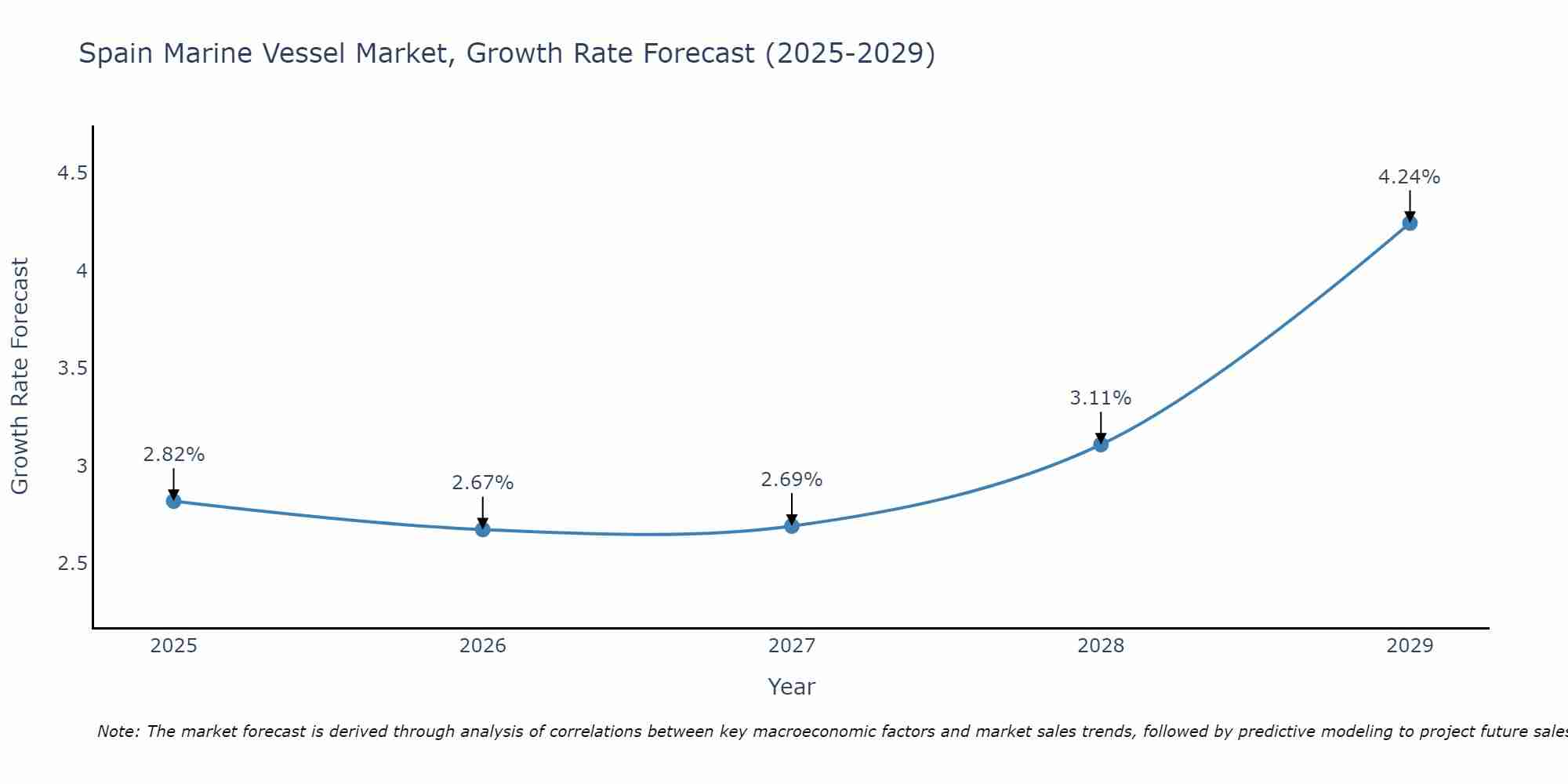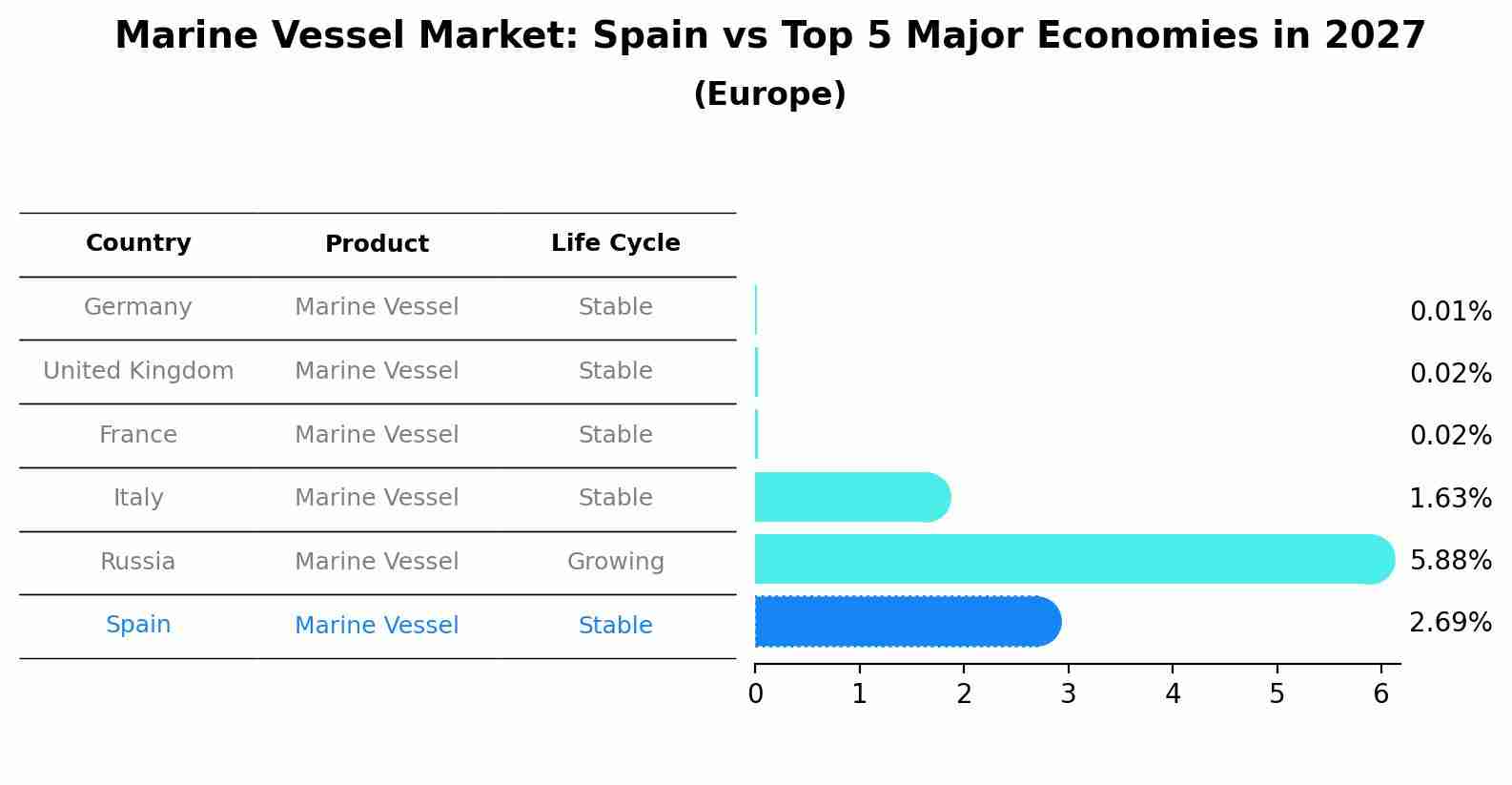Spain Marine Vessel Market Outlook | Value, Forecast, Growth, Share, Trends, COVID-19 IMPACT, Revenue, Companies, Size, Analysis & Industry
| Product Code: ETC382994 | Publication Date: Aug 2022 | Updated Date: Jul 2025 | Product Type: Market Research Report | |
| Publisher: 6Wresearch | Author: Vasudha | No. of Pages: 75 | No. of Figures: 35 | No. of Tables: 20 |
Spain Marine Vessel Market Size Growth Rate
The Spain Marine Vessel Market is projected to witness mixed growth rate patterns during 2025 to 2029. The growth rate starts at 2.82% in 2025 and reaches 4.24% by 2029.

Marine Vessel Market: Spain vs Top 5 Major Economies in 2027 (Europe)
In the Europe region, the Marine Vessel market in Spain is projected to expand at a stable growth rate of 2.69% by 2027. The largest economy is Germany, followed by United Kingdom, France, Italy and Russia.

Spain Marine Vessel Market Synopsis
The Spain Marine Vessel Market is a significant segment of the country`s maritime industry, comprising various types of vessels such as cargo ships, fishing boats, yachts, and naval vessels. Spain`s strategic location as a gateway to the Mediterranean and the Atlantic Ocean has boosted the demand for marine vessels for both commercial and leisure purposes. The market has seen growth in recent years driven by factors such as increasing maritime trade activities, tourism, and government investments in naval infrastructure. Key players in the Spain Marine Vessel Market include shipbuilders, ship owners, and equipment suppliers, contributing to a competitive landscape. The market also faces challenges such as regulatory compliance, environmental concerns, and fluctuating fuel prices, which influence purchasing decisions and technological advancements in vessel design and propulsion systems.
Spain Marine Vessel Market Trends
The Spain Marine Vessel Market is experiencing several key trends. Firstly, there is a growing demand for eco-friendly and sustainable vessels as environmental concerns become more prominent. This includes the adoption of cleaner propulsion technologies such as LNG and hybrid systems. Secondly, digitalization and automation are playing a significant role in improving efficiency and safety in marine operations. This includes the use of data analytics, IoT sensors, and autonomous technologies. Thirdly, there is an increasing focus on vessel design and construction to enhance fuel efficiency and reduce emissions. Overall, the Spain Marine Vessel Market is moving towards more sustainable practices, advanced technologies, and innovative solutions to meet the evolving needs of the industry and regulatory requirements.
Spain Marine Vessel Market Challenges
In the Spain Marine Vessel Market, some challenges include economic uncertainties impacting consumer spending on leisure activities such as boating, fluctuating fuel prices affecting operational costs for vessel owners, stringent environmental regulations requiring vessels to meet emission standards, and competition from other recreational activities. Additionally, the seasonal nature of boating in Spain poses challenges for businesses in terms of maintaining consistent revenue throughout the year. Furthermore, the impact of external factors such as weather conditions and geopolitical events can also affect the demand for marine vessels in the market. Overall, balancing these challenges while adapting to changing consumer preferences and regulatory requirements remains crucial for businesses operating in the Spain Marine Vessel Market.
Spain Marine Vessel Market Investment Opportunities
The Spain Marine Vessel Market presents diverse investment opportunities across various sectors such as shipbuilding, maritime technology, and services. Investing in shipbuilding companies can offer potential growth as Spain has a strong tradition in ship construction and repair. Additionally, investing in companies specializing in maritime technology, such as advanced navigation systems or eco-friendly propulsion systems, can capitalize on the increasing demand for innovative solutions in the industry. Furthermore, there is potential in investing in companies providing maritime services like logistics, maintenance, and port operations, as Spain boasts a strategic location with access to major shipping routes. Overall, the Spain Marine Vessel Market offers a range of investment options catering to different risk appetites and investment objectives.
Jordan Agar Market Government Policies
In Spain, government policies related to the Marine Vessel Market are primarily focused on promoting sustainable practices and safeguarding the marine environment. Regulations such as the Maritime Safety and Pollution Prevention Act and the Marine Strategy Framework Directive set standards for vessel safety, emissions control, and environmental protection. Additionally, the government offers incentives and subsidies for vessel owners who invest in eco-friendly technologies and practices, aiming to reduce carbon footprint and improve overall sustainability in the maritime sector. Compliance with international maritime regulations, including those set by the International Maritime Organization (IMO), is also a key priority to ensure that Spain`s marine vessel market operates in line with global standards and commitments to environmental conservation.
Spain Marine Vessel Market Future Outlook
The Spain Marine Vessel Market is expected to show moderate growth in the coming years, driven by factors such as increasing maritime trade activities, technological advancements in vessel design and propulsion systems, and growing demand for eco-friendly and energy-efficient vessels. The market is likely to benefit from government initiatives promoting the development of the maritime sector and supporting the adoption of sustainable practices. However, challenges such as fluctuating fuel prices, regulatory changes, and economic uncertainties may impact the market`s growth trajectory. Overall, with a focus on innovation and sustainability, the Spain Marine Vessel Market is poised for expansion, particularly in segments like cruise ships, offshore support vessels, and eco-friendly vessels catering to the growing demand for green transportation solutions.
Key Highlights of the Report:
- Spain Marine Vessel Market Outlook
- Market Size of Spain Marine Vessel Market, 2021
- Forecast of Spain Marine Vessel Market, 2031
- Historical Data and Forecast of Spain Marine Vessel Revenues & Volume for the Period 2018 - 2031
- Spain Marine Vessel Market Trend Evolution
- Spain Marine Vessel Market Drivers and Challenges
- Spain Marine Vessel Price Trends
- Spain Marine Vessel Porter's Five Forces
- Spain Marine Vessel Industry Life Cycle
- Historical Data and Forecast of Spain Marine Vessel Market Revenues & Volume By Type for the Period 2018 - 2031
- Historical Data and Forecast of Spain Marine Vessel Market Revenues & Volume By Commercial Vessel for the Period 2018 - 2031
- Historical Data and Forecast of Spain Marine Vessel Market Revenues & Volume By Passenger Ship for the Period 2018 - 2031
- Historical Data and Forecast of Spain Marine Vessel Market Revenues & Volume By LNG/LPG Carrier for the Period 2018 - 2031
- Historical Data and Forecast of Spain Marine Vessel Market Revenues & Volume By Special Purpose Vessel for the Period 2018 - 2031
- Historical Data and Forecast of Spain Marine Vessel Market Revenues & Volume By System for the Period 2018 - 2031
- Historical Data and Forecast of Spain Marine Vessel Market Revenues & Volume By Marine Engine for the Period 2018 - 2031
- Historical Data and Forecast of Spain Marine Vessel Market Revenues & Volume By Sensor System for the Period 2018 - 2031
- Historical Data and Forecast of Spain Marine Vessel Market Revenues & Volume By Control System for the Period 2018 - 2031
- Historical Data and Forecast of Spain Marine Vessel Market Revenues & Volume By Electrical System for the Period 2018 - 2031
- Historical Data and Forecast of Spain Marine Vessel Market Revenues & Volume By Auxiliary System for the Period 2018 - 2031
- Historical Data and Forecast of Spain Marine Vessel Market Revenues & Volume By Communication System for the Period 2018 - 2031
- Historical Data and Forecast of Spain Marine Vessel Market Revenues & Volume By End-use for the Period 2018 - 2031
- Historical Data and Forecast of Spain Marine Vessel Market Revenues & Volume By Original Equipment Manufacturer (OEM) for the Period 2018 - 2031
- Historical Data and Forecast of Spain Marine Vessel Market Revenues & Volume By Aftermarket for the Period 2018 - 2031
- Spain Marine Vessel Import Export Trade Statistics
- Market Opportunity Assessment By Type
- Market Opportunity Assessment By System
- Market Opportunity Assessment By End-use
- Spain Marine Vessel Top Companies Market Share
- Spain Marine Vessel Competitive Benchmarking By Technical and Operational Parameters
- Spain Marine Vessel Company Profiles
- Spain Marine Vessel Key Strategic Recommendations
Frequently Asked Questions About the Market Study (FAQs):
Export potential assessment - trade Analytics for 2030
Export potential enables firms to identify high-growth global markets with greater confidence by combining advanced trade intelligence with a structured quantitative methodology. The framework analyzes emerging demand trends and country-level import patterns while integrating macroeconomic and trade datasets such as GDP and population forecasts, bilateral import–export flows, tariff structures, elasticity differentials between developed and developing economies, geographic distance, and import demand projections. Using weighted trade values from 2020–2024 as the base period to project country-to-country export potential for 2030, these inputs are operationalized through calculated drivers such as gravity model parameters, tariff impact factors, and projected GDP per-capita growth. Through an analysis of hidden potentials, demand hotspots, and market conditions that are most favorable to success, this method enables firms to focus on target countries, maximize returns, and global expansion with data, backed by accuracy.
By factoring in the projected importer demand gap that is currently unmet and could be potential opportunity, it identifies the potential for the Exporter (Country) among 190 countries, against the general trade analysis, which identifies the biggest importer or exporter.
To discover high-growth global markets and optimize your business strategy:
Click Here- Single User License$ 1,995
- Department License$ 2,400
- Site License$ 3,120
- Global License$ 3,795
Search
Thought Leadership and Analyst Meet
Our Clients
Related Reports
- Saudi Arabia Car Window Tinting Film, Paint Protection Film (PPF), and Ceramic Coating Market (2025-2031) | Strategy, Consumer Insights, Analysis, Investment Trends, Opportunities, Growth, Size, Share, Industry, Revenue, Segments, Value, Segmentation, Supply, Forecast, Restraints, Outlook, Competition, Drivers, Trends, Demand, Pricing Analysis, Competitive, Strategic Insights, Companies, Challenges
- South Africa Stationery Market (2025-2031) | Share, Size, Industry, Value, Growth, Revenue, Analysis, Trends, Segmentation & Outlook
- Afghanistan Rocking Chairs And Adirondack Chairs Market (2026-2032) | Size & Revenue, Competitive Landscape, Share, Segmentation, Industry, Value, Outlook, Analysis, Trends, Growth, Forecast, Companies
- Afghanistan Apparel Market (2026-2032) | Growth, Outlook, Industry, Segmentation, Forecast, Size, Companies, Trends, Value, Share, Analysis & Revenue
- Canada Oil and Gas Market (2026-2032) | Share, Segmentation, Value, Industry, Trends, Forecast, Analysis, Size & Revenue, Growth, Competitive Landscape, Outlook, Companies
- Germany Breakfast Food Market (2026-2032) | Industry, Share, Growth, Size, Companies, Value, Analysis, Revenue, Trends, Forecast & Outlook
- Australia Briquette Market (2025-2031) | Growth, Size, Revenue, Forecast, Analysis, Trends, Value, Share, Industry & Companies
- Vietnam System Integrator Market (2026-2032) | Size, Companies, Analysis, Industry, Value, Forecast, Growth, Trends, Revenue & Share
- ASEAN and Thailand Brain Health Supplements Market (2025-2031) | Strategy, Consumer Insights, Analysis, Investment Trends, Opportunities, Growth, Size, Share, Industry, Revenue, Segments, Value, Segmentation, Supply, Forecast, Restraints, Outlook, Competition, Drivers, Trends, Demand, Pricing Analysis, Competitive, Strategic Insights, Companies, Challenges
- ASEAN Bearings Market (2025-2031) | Strategy, Consumer Insights, Analysis, Investment Trends, Opportunities, Growth, Size, Share, Industry, Revenue, Segments, Value, Segmentation, Supply, Forecast, Restraints, Outlook, Competition, Drivers, Trends, Demand, Pricing Analysis, Competitive, Strategic Insights, Companies, Challenges
Industry Events and Analyst Meet
Whitepaper
- Middle East & Africa Commercial Security Market Click here to view more.
- Middle East & Africa Fire Safety Systems & Equipment Market Click here to view more.
- GCC Drone Market Click here to view more.
- Middle East Lighting Fixture Market Click here to view more.
- GCC Physical & Perimeter Security Market Click here to view more.
6WResearch In News
- Doha a strategic location for EV manufacturing hub: IPA Qatar
- Demand for luxury TVs surging in the GCC, says Samsung
- Empowering Growth: The Thriving Journey of Bangladesh’s Cable Industry
- Demand for luxury TVs surging in the GCC, says Samsung
- Video call with a traditional healer? Once unthinkable, it’s now common in South Africa
- Intelligent Buildings To Smooth GCC’s Path To Net Zero


















